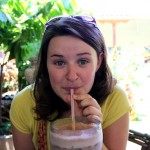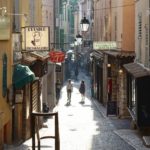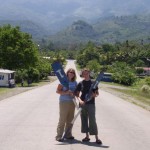I’ll Always Be a Stranger in Canada, and That’s OK

Last year, on July 1st (the national holiday in Canada), I stepped on the Maple Land for the first time, with the intention of living there for two years. Being originally from France but having already lived in Scotland, I thought that the language would not be a barrier and that my acclimation would be smooth and quick. I had never set foot in North America before, but Montreal airport’s large windows, mix of languages and smell of rubber felt reassuringly familiar to me. I didn’t think I would be a stranger in Canada.
However, as I walked out of the airport, I realized that I was in unknown territory. The smell of the air was different. It took me aback and made me feel uneasy. It smelled like sand and sugar, and it filled everything with a heavy languor that sat on my heart. I silently took my place in the car and tried to explain this uncanny feeling away as my lack of a proper night’s sleep.
I could not help but notice how massive some cars looked, how small I felt on the spacious Canadian roads. I lost myself in the forests we drove by and in the immense freeways we navigated. The houses we passed made me think of movies I had watched, with their white panels and their tidy front yards overflowing with colours.
The unease intensified with the days, even though I was thrilled about my trip. I found Ottawa to be exciting and diverse, albeit immense, shapeless and daunting. It was not really walkable and I was intimidated by its unfamiliar outline. I did not feel welcome; I felt as if maybe Canada did not have a place for me.
My eyes widened with horror when assessing the local cuisine, I felt like a criminal every time I lit up a cigarette and I was yet to understand what hockey actually was. I wanted to fit in, but I was too drastically different. I noticed that my accent intensified as time passed and I wondered if I was unconsciously trying to sustain my identity through it.
As I walked out of the airport, I realized that I was in unknown territory. The smell of the air was different. It took me aback and made me feel uneasy. It smelled like sand and sugar, and it filled everything with a heavy languor that sat on my heart. I felt like a stranger in Canada.
Among all things, partying was when I could feel the estrangement most intensely. My first big house party was a perfect example of that. I remember lingering in the hallway, craving a glass of wine. I opened a can of beer and began people-watching. It was riveting. Around me, students drank at a speedy pace from these red plastic cups I had never seen anywhere else than on TV. They were loud, and so was the music, but I managed to lose myself in the sound of their voices. The wet vowels and throaty sounds made me feel homesick, but the slang and the pop culture references made me smile. I could hear people in the backyard yelling “Chug! Chug! Chug!” I winced.
“You seem lost,” said a voice behind me. He was what people might call a “jock”: a handsome, broad-shouldered athletic man, perspiring frat culture. The kind of young man I could very well picture chanting “Take it off! Take it off!” I heard myself answer, my accent strong as ever: “I guess I’m not used to North American parties.” He decided to be my guide and proceeded to explain (and demonstrate) what binge drinking culture consisted off. “We don’t just drink here, we get FUCKED!” he yelled before downing a can of beer. I laughed, and pondered about my failure to fit in.
Maybe it was not a failure; maybe it was exactly how it was supposed to be. I was an observer, a traveler, I was Otherness. No matter how much I loved Canada, I would never be a part of this “we”, and there was no changing this. I would always be the French girl, I just had to learn to be okay with it. I kept this idea in the back of my head and the anxiety subsided.
He was what people might call a “jock”: a handsome, broad-shouldered athletic man, perspiring frat culture. The kind of young man I could very well picture chanting “Take it off! Take it off!”
One weekend of September, I went to a cottage by a lake. The beauty of the scenery mesmerized me and I swam, hiked and canoed with delight. Being lost in nature, it seemed, gave me a precious feeling of universal belonging. As I was packing my bag at the end of the weekend, I realized something of utmost importance. Canada didn’t have to feel familiar, it didn’t have to feel mine or to resonate within my previous experiences. It was novelty, and I had to learn to be at ease with it. As a mentor of mine says, to “get comfortable feeling uncomfortable.” Isn’t it during our most uncomfortable travels that we learn the most?
Being foreign gave me another perspective on things, it gave me something more. So I decided to let go, to stop trying to project myself within the landscapes, within the eyes of strangers, and to instead start receiving. I took a step back and contemplated.
It was a fine place indeed.
Photo by Pixabay.








